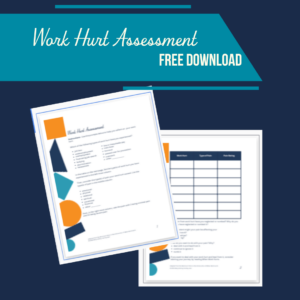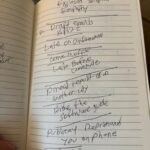
Follow Me on Substack
Most of my blog-style posts are now on Substack. Check it out, and subscribe to have the posts delivered directly to your inbox. When you subscribe, you'll get a free Work Hurt Assessment.

“Being an accountant in a toxic culture working for a bully boss is extra stressful. You are the messenger of bad news and the numbers may seem bad. If you work for an insecure boss you are in a “no-win” situation. When the numbers are good, you are a threat to the bully boss who might be replaced by your good work. To survive, you must let the bully boss take all the credit for the good number crunching. To save your ass, you must document your work when the paranoid boss blames you for bad numbers.” I met Gary at an author event at my local library this summer…. Continue reading on Substack.
Sometimes it’s hard to get to know someone you’ve met only briefly or follow on social media. How do you piece together brief snippets to understand the whole? Outside of a longstanding relationship, it’s probably impossible. But maybe you can get to know a person little by little through their writing. So here are four articles to help you get to know me. “Searching for Home” In this piece written for Fathom magazine, you’ll learn a little bit about where I’m from, where I’ve been, and how my faith helps me make sense of the concept of home. Read it here. “Oriented by Hope” Advent is one of my favorite times of the year. Many churches celebrate it during the four weeks leading up to Christmas. Hope is also one of my favorite themes in the Christian Scriptures. I wrote this article for the De Pree Center’s 2023 Advent journal: Keeping Watch. Read the article here. “When Work Disappoints” I’ve written about some of my work heartbreak before, but this was the first article in which I was able to start talking about what we do after work hurts. How do we handle the grief? Read more in this article …
Rejection is never fun, and it’s unfortunately a fairly common experience in the world of work. It comes in a variety of forms—like when we get passed over for a job or promotion, when our boss dismisses our ideas, when a client turns down a proposal, or when our colleagues exclude us. Rejection can make us feel like we’re not enough. Not qualified enough. Assertive enough. Competitive enough. Cool enough. And we may experience shame and self-doubt as a result. Sometimes that shame and self-doubt will cripple us, making it seem impossible to complete another application, try again, or attempt to make friends. Other times, it might launch us into fight mode, motivating us to dig in and double down on our efforts to get noticed or feel accepted. A recent experience of rejection made me spiral for a few days. I had been asked to submit a proposal for an academic conference—something I hadn’t done in years. Over the course of a few weeks, I cobbled together a proposal highlighting one of the findings from our recent research. Even though my academic writing chops felt a bit rusty, I felt pretty good about what I submitted. Then the rejection …
It’s no secret: We don’t all approach work the same way. Some of us throw ourselves into our jobs. We love what we do. Others of us are less enthusiastic. We show up to work and give it some effort. Maybe we’ve learned the hard way about what Sarah Jaffe writes about in her book Work Won’t Love You Back. Recently I read an article about some early research on workaholism. Janet T. Spence and Ann S. Robins believe that workaholism revolves around three characteristics: Work Involvement, Drivenness, and Work Enjoyment. Here’s a brief synopsis of each. Work Involvement – A high commitment to work evidenced by spending a lot of time on it Drivenness – An inner compulsion or pressure to work Work Enjoyment – Liking work, getting lost in it, or feeling a sense of flow in it Initially, Spence and Robbins thought about two categories of people: workaholics and work enthusiasts. In their words, “the workaholic is highly work involved, feels compelled or driven to work because of inner pressures, and is low in enjoyment of work.” The work enthusiast, on the other hand, is “highly work involved, but unlike the latter, is high in enjoyment and …
I often show up to work afraid. Afraid that the products and resources I develop will be overlooked in a market with so many amazing offerings. Today’s passage helped me to see the source of my fear: I’m operating with a scarcity mindset. A scarcity mindset says that there’s not room enough for me and what I create in this world. Too many other brilliant people and products are already taking up space in the market. John the Baptist didn’t operate with a scarcity mindset. When he found himself baptizing in the same place as Jesus, he didn’t mind “because there was plenty of water” (John 3:23). He didn’t see himself in competition with Jesus. He saw himself in cooperation with Jesus. Plenty of people needed to be baptized that day. Another short phrase in this passage reinforces this theme of plenty, of abundance. The Apostle John who authored the gospel wrote, “God gives the Spirit without limit” (John 3:34). I think John the Baptist knew this. I think this truth helped fuel his confidence to baptize with freedom instead of fear. His job was to show up and do the work of pointing people to Jesus. The rest–the outcome …




